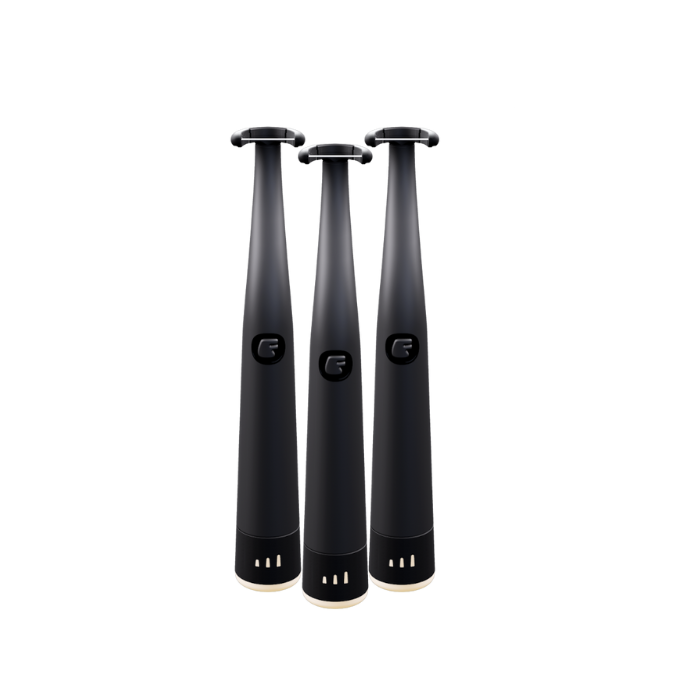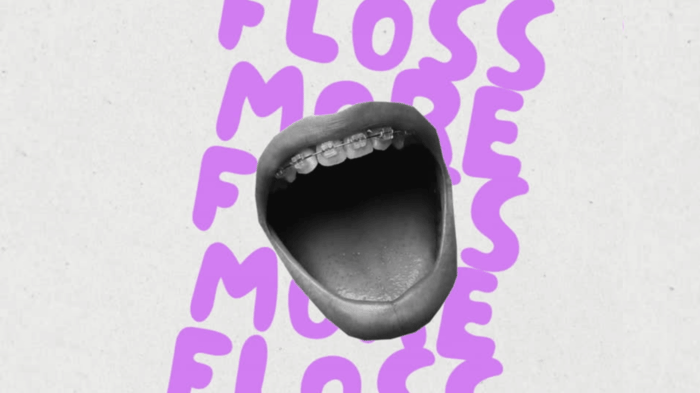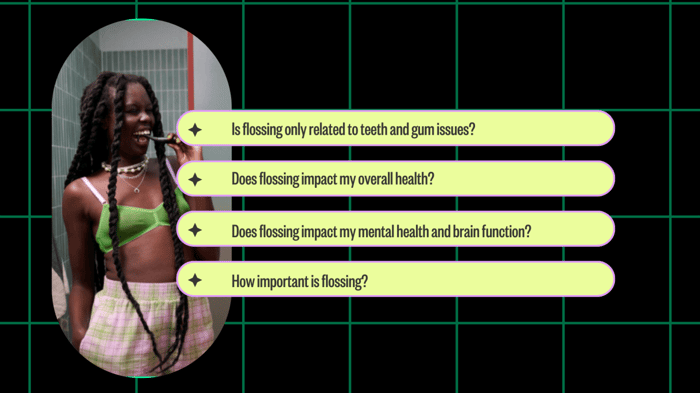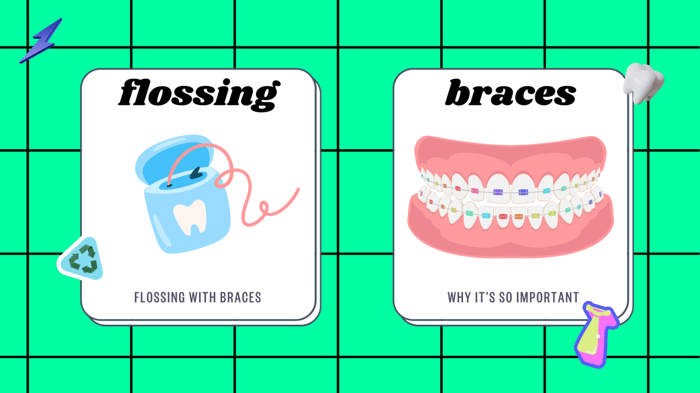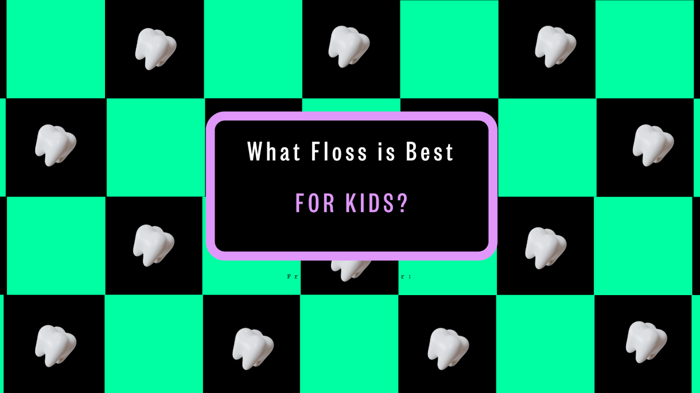You might be a responsible twice-a-day brusher, but are you flossing? If your answer is 'only after I eat popcorn', that might not be enough to claim you're a dedicated flosser. So, how often should I floss, you ask? Let's dive into this and get to the bottom of the question: how often should I floss for optimal dental health?
We all know that brushing isn't enough; you must also floss daily. This comes as important advice from dental experts worldwide, including the American Dental Association. Beyond just removing food debris, daily flossing helps prevent harmful plaque buildup and reduces the risk of gum diseases. Using an electric flosser, like Flaus, takes it a notch higher, making flossing even less time consuming and easier to do - as simple and comfortable as using your electric toothbrush.
It is recommended to floss at least once a day to effectively remove plaque and food particles from between your teeth and along the gumline. Consistent daily flossing can significantly contribute to preventing gum disease and maintaining good oral health.
Flossing: Its Benefits
Although flossing might feel like a chore, it is actually a crucial part of maintaining good oral health. When you floss regularly, you're removing plaque that forms between your teeth and along the gum line, ultimately preventing serious oral health issues in the long run.
Using traditional dental floss can sometimes feel like a hassle, but with innovative products like Flaus, flossing becomes more convenient and part of your routine. The gentle vibrations of an electric flosser make it easier to remove plaque and food particles from hard-to-reach areas between the teeth. This means a reduced risk of gum disease, fresher breath, and a lower likelihood of cavities.
Another notable benefit of using an electric flosser, like Flaus, is that it makes flossing more accessible to people with limited dexterity or those who struggle with traditional flossing methods. This opens up the possibility of better oral care to a wider range of individuals, ensuring that everyone has the opportunity to maintain optimal dental health.
Now that you understand the numerous benefits of using an electric flosser for preventative oral care, let's explore what dentists recommend regarding how often individuals should be using this technology.
Dentist Recommendations on How Often Should I Floss? (Flossing Frequency)
Flossing is like exercise for your teeth. Dental professionals across the board usually suggest flossing once a day. This recommended frequency isn't just a random number—here's why it matters so much.
Plaque is a sticky film of bacteria that constantly forms on your teeth. When you don't floss daily, this plaque hardens into tartar, which is tough to remove. When tartar accumulates, it can lead to serious problems like gum disease and tooth loss. This is what makes maintaining the right flossing frequency crucial.
Think of it this way: skipping flossing for even a day is like leaving a window of opportunity open for plaque to develop into tartar and start wreaking havoc on your oral health.
The American Dental Association (ADA) also backs up this advice, emphasizing that daily flossing removes food particles and plaque from places where a toothbrush cannot easily access.
So, if you're aiming for top-notch oral health, consistency is key. Set a routine and stick to it—floss every day to keep plaque and tartar at bay. Your gums, teeth, and future dental bills will thank you!
Now that we understand the importance of daily flossing for optimal dental health, let’s explore practical techniques that can maximize its effectiveness in maintaining oral hygiene.
Techniques for Effective Home Flossing
Flossing is an essential part of maintaining optimal dental health, but many people struggle with doing it correctly. The proper flossing technique can make a significant difference in how effectively you remove plaque and food particles from between your teeth.
One of the most crucial aspects of flossing is to ensure that you are using the C shape flossing technique. When you start flossing, make sure to be gentle but thorough. Curve the floss around each tooth in a C shape and carefully slide it up and down against the tooth surface and just underneath the gum line. This sweeping motion helps remove plaque and particles that brushing alone can't reach.
Now, here's where electric flossers like Flaus really shine. Their ergonomic design and advanced features make effective, hassle-free flossing at home a reality for everyone. With their new technology, they simplify the entire process, making it not only more convenient but also more enjoyable.
By taking advantage of these innovative devices, you can ensure that every tooth is thoroughly cleaned without the hastle of traditional floss or having to stick your fingers in your mouth. The ergonomic reach handle and cleaning power provided by electric flossers can significantly enhance your oral hygiene routine.
There are plenty of ways to improve your flossing technique, and with advancements in technology, achieving optimal dental health has never been easier. Now let's delve into some additional tips that will help you maintain a healthy smile.
The Role of Professional Dental Cleaning
While home care is essential for maintaining good dental health, certain areas are difficult to reach effectively with regular brushing and flossing. This is where professional dental cleanings come into play. Tartar, also known as hardened plaque, can build up on your teeth over time, particularly in hard-to-reach places. Despite your best efforts at home, tartar can still accumulate and lead to potential issues like gum disease and cavities if left unaddressed.
When you get a professional dental cleaning, a dental professional uses special tools to remove tartar from your teeth and gums thoroughly and efficiently. This helps minimize the risk of oral health problems. Additionally, your dentist can perform a comprehensive examination to identify any potential issues early, allowing for timely intervention and prevention of more serious problems down the road.
Consider professional dental cleanings as a tune-up for your mouth—akin to taking your car in for regular maintenance checks. It's all about catching potential issues early and maintaining optimal functioning. Professional dental cleanings provide a more thorough level of cleanliness that complements your daily oral care routine.
With an understanding of how professional dental cleaning works hand-in-hand with home care flossing and alternative methods, like Flaus, it's time to explore further the foods that promote frequent flossing.
Foods Promoting Frequent Flossing
It might sound surprising, but certain foods can actually encourage you to floss more often. Let's explore why.
First off, let's talk about popcorn. As delicious as it is, those sneaky little kernels have a way of finding their way between your teeth. Flossing right after enjoying your favorite flick can help dislodge any remnants and prevent potential irritation and inflammation of the gums from those tiny, yet stubborn, pieces.
Now, seeds and nuts also deserve a mention here. They're packed with nutrients and are great for snacking, but they tend to leave particles behind in your teeth. These little fibers from seeds and nuts can get wedged into the tight spaces between your teeth, making them perfect targets for flossing.
Imagine this scenario: You indulge in some walnuts or sunflower seeds during your midday snack. Afterward, there's always a chance that small pieces of these nutritious snacks will remain wedged between your teeth. However, by flossing after consuming these foods, you can effectively remove these particles and avoid potential dental issues in the future.
Ultimately, these types of food particles have a knack for hiding in the nooks and crannies of your mouth, making them prime candidates for bringing out that trusty floss. More importantly, frequent flossing helps prevent plaque buildup and reduces the risk of gum disease. Plus, it maintains oral hygiene and ensures that your pearly whites remain healthy and sparkling.
Some might argue that this seems like extra effort after enjoying their favorite snacks. However, it’s worth noting that a couple of extra minutes spent on post-snack flossing may save you from unpleasant dentist visits down the road.
By recognizing the connection between certain foods and the need for post-meal flossing, we're actively taking proactive steps toward maintaining optimal oral health.
Understanding how specific foods relate to our dental care routines sets the stage for our exploration into the larger impact of poor flossing habits on overall dental health.
Impact of Poor Flossing Habits
Flossing might sometimes seem like a tedious addition to your oral hygiene routine, but overlooking this crucial step can have some serious consequences. Neglecting proper flossing can lead to the accumulation of plaque, a sticky film filled with bacteria that forms between your teeth and along the gum line.
This plaque accumulation can eventually harden and develop into tartar, which is tough to remove and can only be removed by dental professionals. This creates a domino effect—plaque hardens into tartar, leading to gum disease known as gingivitis, then escalating into periodontitis in severe cases, which can result in bone damage. So think of daily flossing as a protective barrier against this build-up of plaque and tartar.
If you don't consistently floss, that plaque has a greater chance of causing cavities. The bacteria in plaque produce acid, which damages your teeth and causes decay over time. And how would we feel about more cavities or getting them filled? Not ideal, right?
Not to mention the threat to your smile—a buildup of plaque and tartar can lead to unsightly gums and persistent bad breath. We may not even notice these issues at first but others definitely will.
The Necessity of Consistent Flossing
Some might say they brush their teeth twice a day so why is flossing so important? Well, imagine if you painted a room's walls but didn't bother with the corners—eventually, dust and grime would accumulate there (not to mention, the different color). Similarly, brushing can't always reach all those tight spaces between your teeth like floss does. So consistent flossing alongside brushing is vital for comprehensive oral care.
Gum disease isn't just uncomfortable; it's also been linked to several serious health conditions including heart disease, diabetes, dementia, and complications during pregnancy. It's clear that poor flossing habits reach well beyond just oral hygiene.
Think of flossing as taking out the trash—skipping it every now and then won't cause immediate problems but neglect it for too long and you're in for some unpleasant consequences.
It's evident that consistent flossing plays a key role in not only preserving our oral health but also in safeguarding our overall well-being.
The Place of Flossing in Overall Oral Hygiene
When it comes to our teeth and gums, it's more than just brushing twice a day. Our mouths are complex places, and taking care of them goes beyond a simple scrub with toothpaste. Along with regular dental check-ups and mouthwash, flossing is crucial to ensuring that our mouths stay healthy.
Think of floss as the secret agent of your mouth—a superhero that dives into the tight, hidden spots between your teeth where other dental tools can't reach. When food gets stuck there, it can build up and cause plaque, leading to problems if left unchecked.
In fact, without flossing, nearly 40% of your tooth's surface remains uncleaned. This means that without flossing, even with regular brushing and mouthwash use, you're at a higher risk for gum disease and cavities.
How Floss Complements Other Practices
Flossing isn't just an add-on to brushing—it plays a key role. While brushing takes care of the surfaces of your teeth, flossing focuses on the tight spaces in between them. In combination with mouthwash, as well as professional cleanings at the dentist's office, these habits work together to maintain overall oral health.
Picture this: You decide to throw a party where you want everything to be perfect. You're meticulous about cleaning the living room space but leave the kitchen untidy. It doesn't matter how clean the living room is if the kitchen is a mess! Similarly, not flossing is like ignoring parts of your mouth when you're trying to keep it clean.
By incorporating daily flossing into our oral healthcare regimen, we're preventing bad breath and visible cavities while actively working towards maintaining healthy gums and preventing serious dental concerns down the road. Flossing complements other oral health practices by ensuring that both surfaces and tight spaces between our teeth are sparkling clean.
Having highlighted the critical role that flossing plays in maintaining oral hygiene, let's discuss how you can make sure you're getting the most out of your flossing routine.
Innovations: Flossing Tools like Flaus
Flossing is often perceived as a necessary evil, but it doesn't have to be that way! Take, for example, Flaus, which is reimagining flossing with its modern design and high-tech performance.
One of the most appealing aspects of an electric flosser like Flaus is its ability to effortlessly access those tight, awkward spaces between your teeth that regular floss can't reach. You know, the ones you always struggle with and end up skipping, which isn't great for dental health. It's also very gentle and comfortable compared to traditional floss, thanks to its advanced sonic vibrations. Additionally, it has an ergonomic handle, making it easy to maneuver and hold onto - no more wrestling with a flimsy piece of string!
It feels fresh, and modern, and aligns perfectly with the shift towards convenient yet effective oral care solutions. We're talking about stylish gadgets that make life easier - who wouldn't want to be on board?
Not only does Flaus make flossing more accessible and less of a hassle, it actively promotes healthy habits by making it enjoyable and effortless. When something is as easy as using an electric flosser like Flaus, it's much easier to stick to a consistent flossing routine.
In a world where time is of the essence and convenience is king, products like Flaus really stand out. They give us an opportunity to take better care of ourselves without a huge time commitment or struggle.
So if you've been struggling with traditional floss and finding it hard to build a solid habit, why not give Flaus a try? Now available on our website, it's just a click away from revolutionizing your oral care routine with its innovative features and modern approach to flossing.
By embracing innovation in oral care like Flaus, we can simplify our daily routines and ensure optimal dental health without inconvenience. It's time to take the leap towards effortless flossing within arm’s reach!
How does flossing frequency impact oral health and hygiene?
The frequency of flossing greatly impacts oral health and hygiene. Regular flossing helps remove plaque and food particles from between teeth, reducing the risk of gum disease and tooth decay. Studies have shown that daily flossing can result in a 40% reduction in the risk of cavities. Therefore, it is recommended to floss at least once a day to maintain optimal dental health.
Are there any studies or research supporting a specific frequency for flossing?
Yes, there have been multiple studies and research supporting the importance of flossing daily for optimal dental health. A comprehensive review published in the Journal of Clinical Periodontology analyzed 12 randomized controlled trials and concluded that daily flossing leads to a significant reduction in plaque accumulation and gum inflammation when compared to less frequent flossing. Additionally, the American Dental Association recommends daily flossing to remove plaque and prevent gum disease, further emphasizing its significance for oral hygiene.
Are there any specific dental conditions that require more frequent flossing?
There are specific dental conditions that may necessitate more frequent flossing. For example, individuals with gum disease or those prone to developing cavities should floss twice a day instead of the recommended once daily. According to a study conducted by the American Dental Association in 2022, increasing the frequency of flossing can significantly reduce plaque buildup and gingival inflammation in patients with these conditions. So, if you have gum disease or are prone to cavities, step up your flossing game to maintain optimal dental health!
Is it possible to over-floss or floss too frequently?
Yes, it is possible to over-floss or floss too frequently. Over-flossing can lead to irritation and damage to your gum tissues. According to a study conducted by the American Dental Association in 2023, excessive flossing was found to increase the risk of gum recession by 23%. It is recommended to floss once a day using proper technique to maintain optimal dental health without causing harm.
What are the benefits of flossing daily versus other frequencies?
Flossing daily has numerous benefits compared to flossing less frequently. Regular flossing removes plaque and debris from between your teeth, preventing gum disease and tooth decay. Studies have shown that daily flossing reduces the risk of developing periodontal diseases by up to 40%. Additionally, it helps maintain fresh breath, as it removes food particles that can lead to bad breath. Flossing daily ensures optimal dental health and decreases the need for costly dental treatments in the long run.








